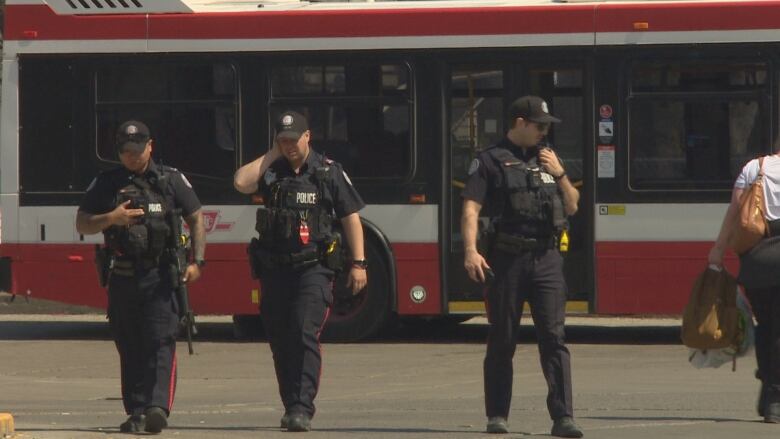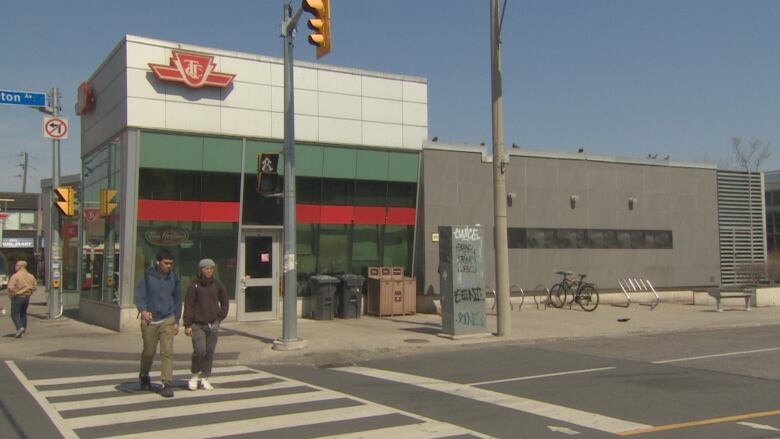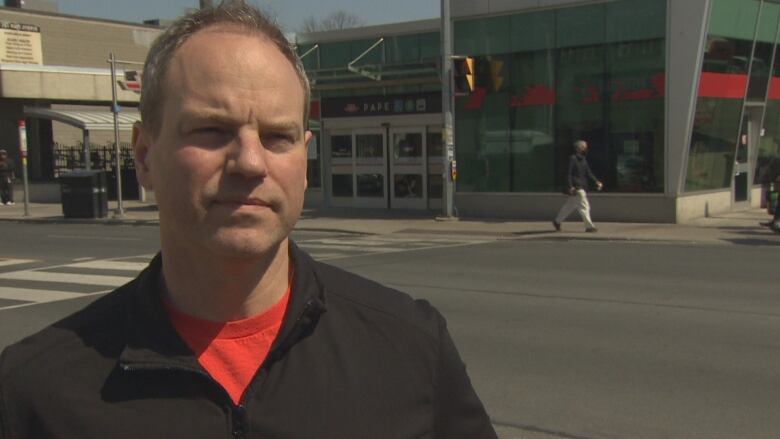Number of offences against TTC customers went down in February: report
Advocate says increased police is only temporary solution

Offences against TTC customers decreased between January and February this year, according to a new report, and the agency is pointing tothe implementation of increased police,agency staff presenceand city programing meant to provide support forhomeless people as drivers of improvement.
One academic says the new data is reflective of that increase in policing, but agrees with advocates who say the larger underlying issues are a lack appropriate shelter facilities and mental health support for people in the city.
Thelatest TTC CEO's report,that is submitted to the agency's board monthly, found there were 136 offences against customers in January, compared to 111 in February. That represents 2.15 incidents per one million boardings in February, compared to 2.72 in January.
Those incidents include assaults, thefts, mischief and harassment among "other items,"though an incident-by-incident breakdown is not provided. CBC Toronto asked the TTC for more details on the data, but was told all the information is in the report.

Following the death of 16-year-oldGabriel Magalhaeswho was stabbed at Keele Station at the end of March, officials need to understand the public may not be finding comfort in the newest data, said Marvin Alfred, president of the ATU Local 113 union that represents 12,000 public transit workers in Toronto and York Region.
"With these stats being displayed, it's one thing they can tout, that these numbers are slowly going down. But at the same time, I think people do not feel the system is truly as safe as they look for it to be," said Alfred.
"The public is calling out for more measures, long term solutions, not the one-time injection of police officers ... investing in transit and investing in the service all together and have people feel safe," he said.
February numbers still high compared to 2022
While the new data shows a decrease, February's numbers are still higher compared to the same period in 2022, according to previous TTC CEO reports. In the first quarter of 2022, there were 1.43 incidents against riders per one million boardings compared to 2.15 in February this year. The 2022 figures were already an increase compared to the fourth quarter of 2021, which saw 1.29 offences against customers per one million boardings.

In previous CEO reports, the agency touted the same programing listed now as part of the solutionagainst transit violence last year.
"Proactive coordination with city programs and Toronto Police Service is having a positive impact," the May 2022 CEO's report states. However, the data from the latest report shows that from that period, incidents declined over the warmer months and spiked again beginning in October 2022.

Last month, Toronto police ended additional patrols on Toronto transit that had been implemented following multiple incidents of violence on TTC property. TPS had announced at the end of January that 80 additional patrols would be added. The city's February budget meeting concluded that police could not afford overtime patrols without additional funding, which cost about $1.5 million per month.
Root causes need addressing, advocate
Cameron McLeod, executive director of the transit advocacy group CodeRedTO, said it's difficult to draw conclusions from a one month change in data. He said spending money on increased police deployment on the TTCwas a reasonable action to help some riders feel safer. But that solution is only temporary and doesn't tackle the root causes.
"We know it only costs a few hundred thousand dollarsto keep warming centres in the winter open for a full month," he said."And all of that money now is gone,spent on overtime pay for those officers, when we could have directed it toward root causes."

Murtaza Haider, a professor and thedirector of research at the Urban Analytics Institute of Toronto Metropolitan University, saidan increased law enforcement presence is a significant deterrent.
"Havingsworn peace officers,sopeople who can act rather than just report the crime, is critical," he said.
Though the most recent data shows a month-to-month decline, and not one that's year-over-year, it's still a welcome development, Haider said.
"That is relevant for commuters," he said."They have to perceive the system to be safe in order for them to return to the system."
The need for more shelter space in the city is also a significant underlying factor behind the violence, Haider said, especially if more cuts to services become a financial necessity.
"That is the big concern if we have to look at the safety, not just on theTTC but safety on streets."
With files from Ryan Jones












_(720p).jpg)


 OFFICIAL HD MUSIC VIDEO.jpg)
.jpg)



























































































